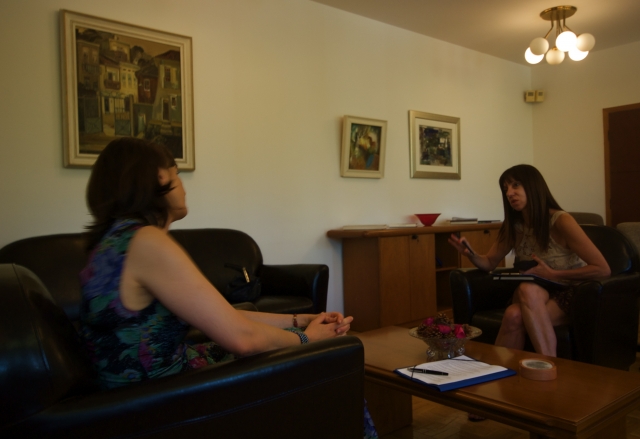Photos: Vassilis Vifidis
Emilia Kraleva has been the new Ambassador of Bulgaria in Athens since May 2012. She represents the modern face of Bulgarian diplomacy, which is characterised by high professionalism and a pragmatic attitude to the specifics of international relations. She graduated in history from Sofia University "St. Kliment Ohridski" and specialised in Balkan history while she was studying. She was working in the Ministry of Foreign Affairs for twenty years, dealing with the Balkan relations and the coordination of the Common Foreign and Security Policy of the European Union. She had worked in our embassy in Athens as well as in London. She returned to the Greek capital after an eight-year break and with memories of the Summer Olympics in 2004. Maria S. Topalova talked with Ambassador Emilia Kraleva.
Your term begins in a period of serenity in the Bulgarian-Greek relations on the one hand and of a serious economic, political and social crisis on the other. What are your professional challenges in the next three years?
It is a challenge for me to go back to Athens especially as the head of our mission after many years of working in the field of Bulgarian-Greek relations. I should contribute to fill these good relations with more meaning that will satisfy the modern era, will help to bring the two nations even closer, to better understand the problems of the other and help each other to overcome them.
I think it is very important to improve the direct links between the two administrations. Both countries are members of the European Union, we have a common legal basis to ground ourselves on and we could very easily work in this direction, if there is a common understanding of the opportunities it offers us. There is always something to be done, to support many areas. Contributing to the improvement of economic cooperation is the first and foremost, the most important thing, it is number one.
What are the priority areas of economic cooperation? Where is the greatest potential for growth?
In my opinion, there is potential in every area. Everything is progressing well, but things can always be even better. Of course, economic relations need to develop; both countries have a boundless growth potential in tourism. Greece is a traditional tourist country and so is Bulgaria, though in another sphere. There are opportunities to combine what each of the countries offers. Of course, we have the sea and the beaches, but what we can offer in a combined package is the mountains. It is not only ski tourism; there are many untapped opportunities - spa tourism, rural tourism, which are things modern man is interested in not only in Europe but also worldwide.
Why haven’t tourism entrepreneurs exploited these opportunities so far and what are the state tools of intervention in tourism, which is mostly a private field?
Indeed, we all expect the market to self-organise because for a long time, nobody has believed in the government intervention in the economy. These options have been discussed after the crisis. I do not think it is an obligation of the state but it could create the relevant conditions and encourage private initiatives in both countries. There are combined packages even now - they are available in the Japanese market, for example. However, this practice may be further promoted.
Greece is one of the largest investors in Bulgaria. How has the economic crisis affected those investments, in which areas are they most successful and in which fields is there potential for development?
Greek investments in Bulgaria are very successful in general. Bulgarian President Rosen Plevneliev met recently with leading Greek businessmen and investors in Bulgaria from various circles and the responses were generally positive. These are sectors such as telecommunications, steel, manufacturing of aluminium products. There are many investments in Bulgarian tourism, in hotel chains. Each of them has its problems but these investments are mainly successful. Greek banks in Bulgaria are still totally successful, and this is due to the healthy financial climate in the country and the supervision carried out by the Bulgarian National Bank. In general, the conditions for doing business in our country are very good. Greek businessmen fit very well into the environment in Bulgaria, find their path, and the majority of them are actually very successful.

Were future ideas for unused opportunities for cooperation discussed during these conversations?
The most important result was the decision to hold a joint meeting of the two ministerial councils in the shortest possible time – by the end of October or in early November. A very thorough preparation by the entire Bulgarian and Greek administrations is necessary in order for this joint meeting to be successful. Many new ideas and projects will be specified there.
The cooperation in combating terrorism and organised crime has become of current interest following the attack in Burgas. How successful is it?
It is still a very successful area of cooperation and there is no reason to comment on the attack in Burgas. No details can be publicly announced but this area is very active. The channel of communication is direct and there are concrete achievements in this regard. The cooperation is very close and there is nothing in the shade. I am saying this with satisfaction as an ambassador.